The rest of the summer of ’66 saw us going from strength to strength as the Pirates travelled the country from one end to the other. I particularly remember waiting at Newbury station, drinking tea, waiting for the Plaza Ballroom to open up. On the juke box came a record which knocked me sideways. It was called “I Fought The Law” by the Bobby Fuller Four, who had captured the Crickets feel perfectly, and added a little magic of their own. Whenever I hear that record I think of the gig at Newbury, and it still has the ability to make the hair stand up on the back of my neck!
We often seemed to be at the seaside too, very fitting for Pirates, taking in towns such as Folkestone, Bournemouth, Seaton and Grimsby. The gig at Bournemouth was promoted by a West London promoter called Pete Southall, who accompanied us to the venue. Pete was slightly worried that the advertising of the show was a bit lacking, so we toured the area in the van with posters all over it, playing songs from our rock ‘n’ roll record collection, windows wide open. We discovered that by taking a lead from the van’s record player to my bass cabinet, we could boost the volume considerably, so it was possible to create a hell of a noise and thus attract plenty of attention! Remember that this was a time when most cars did not even have radios, let alone the mega sound systems which we are so familiar with today! Anyway, it seemed to work and the show was well attended!
Whilst driving across country to yet another far-off gig, Irvo thought that he could hear a rumble from the back axle of the van. Pulling into a country garage, Irvo persuaded an obliging mechanic to take a look, the van being raised up on a hydraulic lift. We had all evacuated the vehicle except Solly, who was fast asleep in the front. Disaster almost struck when he suddenly woke up and attempted to climb out, thinking that we were all in a café. The sight of him clinging onto the door 8 feet above the ground will always stay with me!
As we travelled around, the sense of camaraderie grew. Irvo and Kidd regaled us with stories which today could fill a rock ‘n’ roll history book. He had seen it all and done it all, beginning with skiffle and graduating to his own brand of hard rock and R ‘n’ B, forming probably England’s first power trio as his backing, and becoming one of the most original performers of the era, admired (and copied) by many of the top stars of the day.
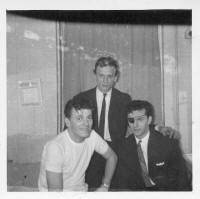
Kidd had met and worked with most of the big U.S. rock stars, and we hung on every word as he told stories of Little Richard, Jerry Lee Lewis and Eddie Cochran. Irvo, too, had just as many stories, having accompanied Kidd throughout his career, apart from a period when he had chauffeured visiting U.S. stars such as the Shirelles, Big Dee Irwin and Brenda Lee.
One of the first things you noticed when in the company of the two Johns was the fact that they spoke in their own language. Not only did they converse in complex Cockney rhyming slang, but they chose their own words to rhyme with the slang! Thus the word “draft” became a “George”, after actor George Raft, and then became a “Cheddar” after Cheddar Gorge. They also used any topical newsworthy name they fancied to rhyme, such as Charley Clore for door, and Steve Race for (suit) case. You knew when the venue was near when you heard Kidd say “open the Steve (Race) and pass the Irish (jig = wig). Every band member was a “thing”, i.e. “Drum Thing” or “Bass Thing”, and Irvo was always the “Road thing”! In the Pirates, you never “went” anywhere, you always “did a lively”! We soon picked up the strange lingo though, and it quickly became second nature.
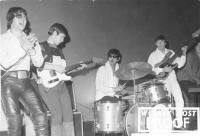
Early in August, a chain of events led to a change in the group’s sound and profile. Johnny still had not appointed a regular agent to procure gigs for us, and work was still a little spasmodic. He had parted company with his previous agent, George Cooper, over financial matters, but was still accepting the odd booking from George. On one particular weekend he received a frantic call from Cooper, who was desperately trying to find a top act to cover for Georgie Fame who was unable to appear. Kidd immediately telephoned around and managed to assemble all of us except Ray, who could not be contacted. It was decided that if we tried any longer to find Ray, then we would be too late for the gig, which was in Weston Super Mare on the North Somerset coast, and so we set off minus our keyboard player. Solly had rushed into Jim Marshall’s shop in Hanwell to grab some drumsticks, telling them that he had to dash, “gigging at Weston Super Mare”! Of course as fate would have it, Ray had popped into Marshall’s later that day, to the amazement of the staff, who assumed that he was with us. Ray, naturally, was a little miffed, wondering what was going on!
As we sped towards Weston Super Mare, it was decided that a stop for tea was necessary, so we pulled into the next transport café and ordered tea and toast. No sooner had we sat down than we were approached by a tall good-looking character, immediately recognizable as hit recording star Eden Kane. After exchanging pleasantries, Eden informed us that he was on his way to Weston Super Mare to fill in for Georgie Fame! Slightly perturbed to say the least, we quickly finished our refreshments and decided that we had to beat Eden Kane to the gig in case we were victims of a double booking! Irvo thought that he knew a shortcut, but we ended up at Cheddar Gorge, hopelessly lost, and didn’t arrive until long after Eden got there. We didn’t have to worry, however. Both acts were billed outside the Winter Gardens, with our name being top of the bill!
After setting up and settling into our dressing room, Irvo went backstage to familiarize himself with the stage lights. He immediately fell foul of a dictatorial stage manager who objected to Irvo’s rather radical approach to lighting! Irvo informed the “jobsworth” in no uncertain terms that he was in charge during the Pirates’’ act. A stand-off ensued until the ballroom manager was summoned. He took one look at Irvo and gave him permission to use the lights as he saw fit, a so a nasty scene was avoided!
Eden Kane and his group, including his brother Peter Sarstedt on bass (soon to have big hits in his own right) put on a great show, performing all his hit songs and going down a storm. We were naturally a little nervous, going on minus our keyboard player, but spurred on by adrenaline we pulled out all the stops, with Johnny blowing the audience away with his superb vocals.
Eden was the first to congratulate us. “Fabulous show, boys” he said, “No one could follow that!” Rather pleased with ourselves, we sat in the dressing room. It was not long before it was unanimously decided that we preferred sound of tonight’s show to what had gone before! Now, it has to be understood that this was no slur on Ray Soper! Ray was a great musician and a lovely man who had given us all hours of pleasure, but none of us could deny the fact the we just preferred the sound of a power trio!
Now came the dilemma of how to tell Ray, our stalwart pal who had made it possible for us to become Pirates! I soon found myself volunteering to tell him, as I felt that he deserved better than just a phone call. The next day found me nervously making my way to Putney, where dear old Ray was quite understanding although rather hurt. Naturally his parents were quite volatile, but this was to be expected. Sadly I said goodbye to Ray, hoping that he at least gave me credit for telling him face to face. Now we got on with the business of being just three Pirates, tailoring our sound the way Kidd had always preferred it – guitar, bass and drums!
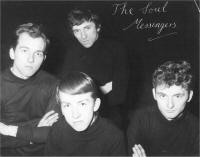
The Weston gig and Ray’s departure led Mick, Solly and myself into pressuring Kidd to bury the hatchet with George Cooper, in order to secure more gigs for the band. Kid decided that this made sense, and made the pilgrimage to the Cooper Organisation HQ in London’s Soho Square. Kidd had always looked on Cooper as a father figure and it was with some relief that we witnessed the two of them emerging from the office, arms around one another, to announce that the parting was over! Now, we thought, the future was assured!
I had not seen much of my old pal Rod Freeman during the time with Kidd, so it was good to meet him again at our show at the Terry Downes’ Club in Harlesden, owned by the former champion boxer. Rod was now fronting his own band in a residency at Tottenham’s Royal Ballroom. His current outfit had originally formed from scratch in 1963, to help out bassist Ken Rankine whose group, the Art Wood Combo (led by Ron’s elder brother), had failed to show up. The gig was such a success that they decided to keep together, operating under the name Soul Messengers. Featuring Rod and Ken, together with Mitch Mitchell on drums and Terry Marshall on sax, soon to be replaced by Gary Bell, they took the name Next 5, hoping to emulate the success of the two previous resident groups at the Royal, the Dave Clark 5 and the Migil 5.
The Pirates, minus Ray, continued to play up and down the country, as George Cooper got busy securing us new bookings. More and more new bands were springing up, with the charts more diverse than ever. Some of the songs blasted out of the radio in our van made a huge impression, such as “Black Is Black” by Los Bravos, “Wild Thing” by The Troggs and particularly “When A Man Loves A Woman” by Percy Sledge. Johnny also took great interest in the soul acts from America such as Sam & Dave, Otis Redding and Ike & Tina Turner. Much of our spare time was spent at Johnny’s house, kicking ideas about for the next single, exploring some of the sounds on the Beatles’ more psychedelic recordings, and even trying some of John’s back catalogue in different formats. Sometimes we recorded these onto John’s portable reel-to-reel tape machine, but nothing really grabbed us. The sudden cancellation of a tour of Scotland depressed us all no end, particularly John, who confided to me that he was considering retiring from performing to pursue a career in management and agency. Naturally I tried to talk him out of such a move, and the subject was not mentioned again.
It was shortly after the Weston Super Mare gig that a song turned up that we all felt was worth recording. An unusual semi-ballad, it was called “Send For That Girl”, written by Barter, Rowland and Victor. On Thursday 18th August 1966 we arrived mid-afternoon at EMI’s famous Abbey Road studios, where Kidd had recorded many times. The session was supervised by Norman Smith who had worked for a number of years at EMI, particularly with the Beatles. We had rehearsed several times at EMI’s Manchester Square studios with Norman, so we felt quite at ease with him. “Send For That Girl” was put down in a couple of takes with Norman at the piano, then in true 60’s fashion we quickly knocked out the ‘B’ side, covering Sandford Clark’s “The Fool”. None of the band were particularly familiar with it, so our version was taught to us by Johnny, leading to a different take on the song! Feeling pleased with our performance, we left the new single in Norman’s capable hands. He would add strings and carry out the final mix. That was the last time I saw Norman Smith, until he appeared on Top Of The Pops performing his own hit recording under the name of Hurricane Smith in 1971!
Feeling quite elated after the first recording session with Kidd, we left Abbey Road on a high. Johnny Irving swiftly drove us back to Harrow where Kidd’s wife Jean had tea and sandwiches waiting for us. After a quick nosh and even quicker clean-up we hit the road once more, with Irvo electing to drive through the night to Dundee, where we were to appear at the Caird Hall. The show was a rip-roaring success, featuring several other bands such as chart toppers David & Jonathan and the highly touted St. Louis Union, who featured none other than Bernie Burns on drums. We reminisced about my audition with the Boomerangs not so long ago, and parted on good terms after the show.
At the end of August we were booked to play on the bandstand at the Birmingham Flower Show where we met ex-Searcher Tony Jackson and his band The Vibrations. Tony and his guitarist needed to get to London and, as their car had broken down, we all squeezed into the Commer van and they travelled back with us to Johnny’s house. Someone suggested holding a séance with a home-made Ouija board. All went ok until the lighting fuse blew, plunging us into darkness! Poor old Tony was gibbering with fright, convinced that it was no coincidence!
More one-nighters took us through into September, with morale high in anticipation of the release of the new single. It was then that George Cooper suggested that we have a go at cabaret! Initially we were all aghast, but George explained that this was the future, pointing out that many rock and pop acts were following the lead of Englebert Humperdinck and Tom Jones who were forging lucrative careers in the clubs. With two weeks to go before our debut in the northern town of Darlington, Johnny decided that we needed to tone down our show and include a couple of old-time standards to satisfy the older folk that would be sure to be there, so rehearsals were held to learn the new songs.
On arriving at the Flamingo Club on September 19th we were amazed to see the same age group queuing up at the entrance as we always saw in the ballrooms! A quick peep at the audience revealed that there were a few older folk present, but all obviously rock ‘n’ roll fans judging by their Teddy Boy clothes! Johnny decided to disperse with the revised act and stick to what we did best, and the crowd absolutely loved it! The boss of the club was so pleased that he presented us with a bottle of vodka which we took back to our comfortable guest house, before demolishing it. The resulting party antics led to a severe reprimand from the landlady who extracted an apology from Kidd, and a promise to behave in future. The following night was as good as the first, and once again back at the digs we slipped into party mode. That was the last straw for our landlady who promptly evicted us the next morning!
Johnny Kidd’s charm and second apology failed to change the landlady’s mind and we were forced to seek new accommodation, finding clean but less comfortable lodgings at another guest house, called the Bluebird. The rest of the week passed without incident. Getting thrown out of our digs was a sobering experience, and we felt slightly ashamed. This was of course long before it became fashionable for bands to trash their accommodation! Also resident in the guest house were another hard-working band called Rob Storme & The Whispers, whose bassist, Lewis Collins, would later become an enormous star, acting alongside Martin Shaw in the popular TV show the Professionals. Lewis spent several hours chatting to Kidd, who was one of his idols. Unable to remember where he was at the time, Lewis recently telephoned me from his home in the U.S.A. I was pleased to be able to remind him where he was, and which band he was with, thus enabling him to get the details right for his forthcoming autobiography.
Sadly, Irvo was not with us for this trip. He had stayed behind to work on a new sideline, having acquired an interest in a scrap metal business situated opposite the famous Ace Café near Wembley. We had assured him that we could cope without him, as our equipment only had to be set up once, and his usual brand of histrionics with the stage lights were not deemed necessary within the confines of a nightclub. I also remember that week for witnessing Otis Redding and his band performing a great live show on television, and for hearing the song “Cherry Cherry” by Neil Diamond, a great new artist who would prove important to me in the not too distant future!
Our next gig was on October 1st at the Royal Air Force base in Waddington. A great time was had by all, the band being particularly well received by the capacity crowd which included a large contingent of young women who had been ferried by coach from the town. Irvo had performed his favourite trick of heating up a half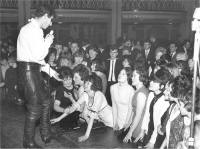 -crown coin by holding it in pliers over a cigarette lighter and then placing it strategically on the floor. Solly had obliged by snatching it up. The scream of pain before it reached his pocket made us all laugh!
-crown coin by holding it in pliers over a cigarette lighter and then placing it strategically on the floor. Solly had obliged by snatching it up. The scream of pain before it reached his pocket made us all laugh!
Another favourite gag was to fill Kidd’s thigh boots with coke bottles, cigarette packets and general rubbish. He never pulled on his boots until he heard me announce his name, and the resulting delay in his appearance, followed by whispered oaths and threats never failed to amuse the rest of us.
Once the applause died away, we congratulated ourselves in the dressing room. That was a good gig, we all agreed, as Johnny sat shirtless, cooling down and dishing out praise to us all. What no-one could know however, was that Johnny had just played his last show!
Thursday, October 6th saw Johnny Kidd, Roger Truth and I hit the road for that night’s show at Oldham. John’s wife, Jean, had decided to travel with us, as we would be staying with old friends of John who had at one time been involved in running his fan club. We had gigs for Thursday night and Saturday night, but Friday was a day off.
Mick Stewart had previously travelled north to stay with his new fiancée, who he had met during our successful week in cabaret, and so was not with us in the bandwagon. Johnny Irving, who usually never allowed Kidd to travel without him, had stayed behind, at Kidd’s insistence, to devote some more time to his new business venture, and so it was Kidd and myself who shared the driving duties up to Oldham. We had departed behind schedule, and traffic was exceptionally heavy, a combination which made us a little late in arriving at the venue, a large ballroom in the town centre. “What’s the best way to Oldham?” enquired Kidd of a passing pedestrian. “One in each hand” came the time-honoured reply.
No-one was particularly concerned at our late arrival, as we knew that the always punctual Mick Stewart would be there early, and in any case, we never went on before 9 o’clock.
Our contract stipulated a 7 o’clock arrival, and we were just over half an hour late, whilst Mick had been there since 5:30, so we were absolutely amazed to find the manager placing “cancelled” stickers across the advertising posters! Johnny immediately turned on his charm, attempting to placate the manager, but he was having none if it! In a manner reminiscent of a member of the Gestapo, he ranted and raged about the terms of the contract, and insisted that the show would not go on! Johnny kept calm in the face of such an obnoxious character, pointing out that the doors had only been open a few minutes, and the expected crowd had yet to arrive.
When it became obvious that the manager would not be placated, Johnny gave him an amazingly generous offer, which said everything about the character of Johnny Kidd. He explained that he would waive his fee for the show and play for free, apart from a small fee for the Pirates. Incredibly, the offer was turned down, and Johnny sadly admitted defeat and ordered our retreat from the premises. Why the manager acted as he did, we will never know. Our late arrival had not threatened the potential success of the evening in the slightest, but for reasons best known to himself, he found it necessary to demonstrate his authority and at the same time unwittingly trigger a chain of events which would end in disaster!
With the Oldham gig cancelled, Johnny put on his thinking cap and decided that tomorrow we would travel to the Imperial Ballroom at Nelson, where manager and old friend Bob Caine would surely be able to arrange an extra gig or two in Lancashire and avoid the trip turning into a financial loss!
Thursday night saw a disappointed Pirates bunk down with Johnny’s friends. On Friday morning I drove Solly and Mick into Manchester, where we visited a few of Solly’s old haunts. He decided to stay in town for the night with some friends, so Mick and I drove back to Leigh to get ready for our trip to Nelson.
Early that evening we set off for Nelson in two cars, Mick and myself being driven in one car, with Johnny a passenger in the following car. At the Nelson Imperial, a huge ballroom, we were introduced by John to the manager Bob Caine, who, taking us into his office, got onto the telephone to see if he could find us a gig or two. Bob had good potential results and promised to call Kidd the next day if he could finalise anything. We said goodbye to Bob, thanking him and reminding him that we would see him soon, as were booked to appear there in a couple of weeks’ time. As we left by the stage door, Johnny and I were in deep conversation about the merits of returning to Germany, where he had commanded a huge following for several years. As Mick Stewart settled himself in the front seat of the car in which we had travelled up, and I prepared to get in the back, John asked Mick if he would travel back in the other car, so that we could continue our discussion. Mick of course agreed, and so they swapped seats. As John thanked Mick and moved to the front passenger seat, a figure loomed from the shadows and approached the car. “You’re Johnny Kidd!” he exclaimed. “Can I have your autograph?” Johnny chatted to the fan for several minutes, reminding him to bring his friends and say hello in two weeks’ time. As the fan walked happily off into the night, no-one could have imagined that Johnny Kidd had just signed his autograph for the very last time!
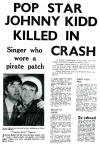
As we left the lights of Nelson behind us, Johnny, full of enthusiasm, chatted away about his German successes, and how confident he was of returning with the new Pirates. Shortly before our destination Johnny announced that a toilet stop was necessary, and so our driver, Wilf, pulled over by a convenient clump of bushes. As I conveyed the reason for our stop to Mick, in the following car, they decided to carry on ahead, shouting “see you there!” as they sped away. Meanwhile, Kidd, having swiftly relieved himself behind a bush, settled back into his seat once more, and we resumed our conversation. Almost home after an uneventful journey, what happened next remains a mystery. Suddenly, for no apparent reason, our car was out of control, heading for a chain-link fence on the opposite side of the road. Both Johnny and Wilf gasped in disbelief, for there was no explanation for our loss of control. Then a car was approaching at speed, unaware of our plight, the driver flashing his headlights to warn us. With a dreadful sound, both cars collided head on, demolishing them completely!
I still marvel at surviving the crash reasonably intact! Both drivers were badly injured and both front-seat passengers died instantly. Helen Read was only 17 years old, being driven home after attending a 21st birthday party.
I was dragged from the wreckage by firemen and taken to hospital. Convinced that I was dying, it was quite a relief to be discharged with several stitched wounds, a smashed left arm and a broken nose! The real damage though was far more than physical, and I sank into deep depression with the date of October 8th 1966 burned deep into my memory. Along with poor Helen Read, we had lost Johnny Kidd, arguably the best rock singer that this country ever produced!
| Chapter 9 ← | → Chapter 11 |
